Why Choosing the Right Burial Urn for Ashes Matters More Than Ever
Burial urns for ashes serve as the final resting place for your loved one's cremated remains, specifically designed for permanent underground placement in cemeteries or memorial gardens.
Quick Answer for Burial Urns for Ashes:
- Purpose: Permanent containers for cremated remains intended for ground burial
- Key Difference: Built for durability underground vs. display urns for home use
- Materials: Wood, metal, marble, ceramic, or biodegradable options
- Size Rule: 1 cubic inch per pound of body weight (200 lb person = ~200 cubic inches)
- Vault Required: Many cemeteries mandate protective urn vaults
- Price Range: $26 to $200+ depending on material and customization
With over 3,000 burial urns available on Amazon alone and cremation rates continuing to rise, families face an overwhelming array of choices during an already difficult time. The decision becomes even more complex when you consider cemetery requirements, material durability, personalization options, and long-term costs.
I'm Mortuary Cooler, a national-level mortuary equipment supplier with extensive experience helping funeral homes and families steer the complexities of burial urns for ashes and related memorial products.
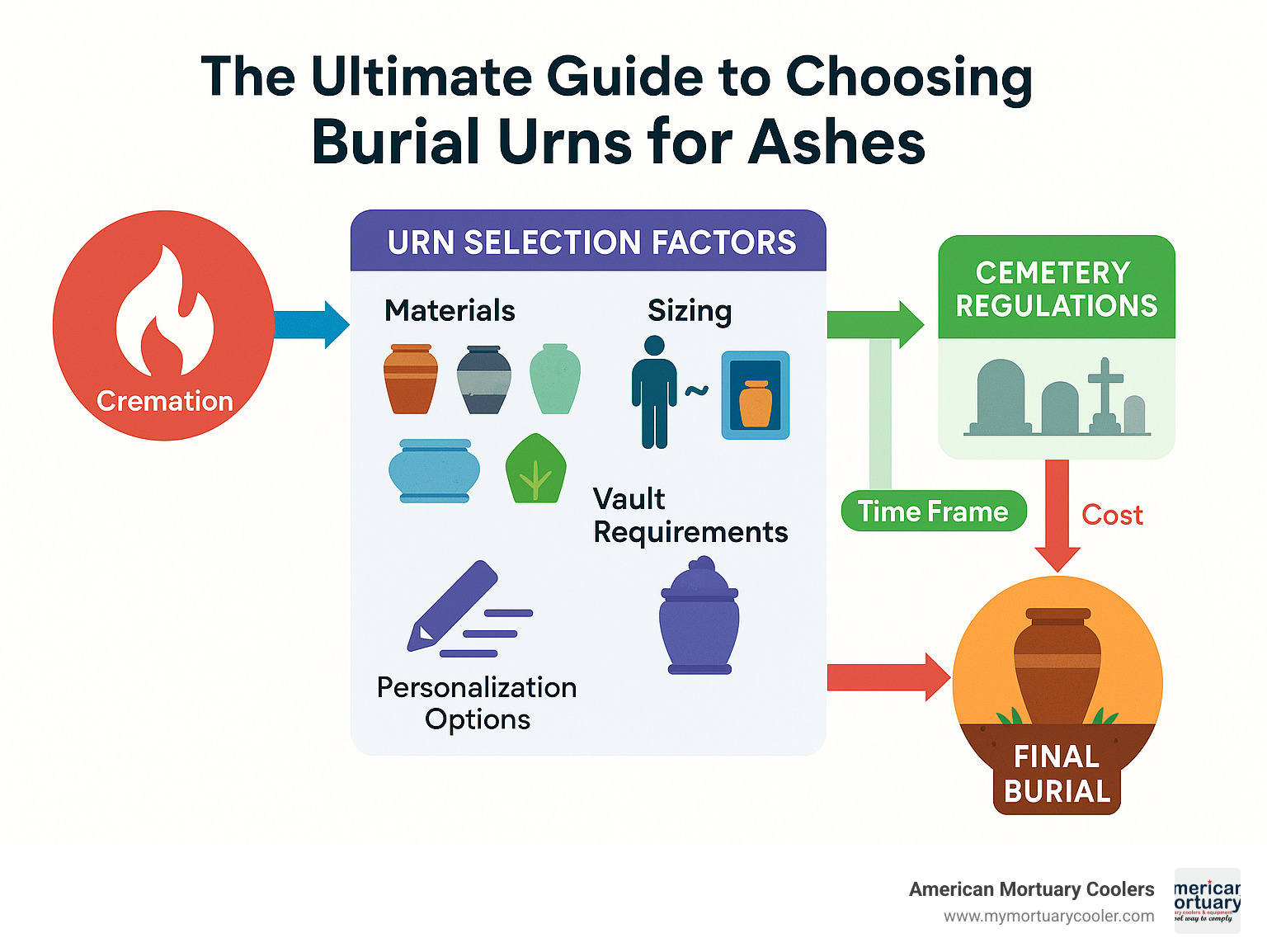
Burial urns for ashes glossary:
Why a Dedicated Guide Matters
The rising popularity of cremation has created new challenges for grieving families. With cremation rates continuing to climb nationwide, more people are encountering burial urn decisions for the first time. The sheer volume of options can create decision paralysis during an emotionally vulnerable time.
What Is a Burial Urn for Ashes – and How Does It Differ?
Burial urns for ashes are specifically built to be your loved one's permanent underground home, engineered for durability and purpose. Unlike decorative urns for display, these are built like tiny fortresses to protect what's precious inside for decades.
The biggest differences lie in durability and cemetery compliance. A keepsake urn holds just a small portion of ashes for multiple family members. A scattering tube is temporary, meant for ceremony use. But burial urns for ashes are the permanent solution with secure closure mechanisms and materials that handle whatever nature throws at them.
Most burial grounds have strict rules about acceptable urns - specific materials, size restrictions, and many mandate protective vaults. Scientific research on grief rituals shows having a permanent memorial location genuinely helps many people process their loss.
Ground Burial vs. Above-Ground Placement
Ground burial places your loved one's urn directly into the earth, usually 2-4 feet deep, creating that traditional grave setting for visits and flowers.
Above-ground placement includes columbarium niches - individual compartments in walls that offer weather protection and space for personalized nameplates. Companion plots allow multiple urns to be placed together for couples or close family members.
Urn vault installation - protective containers made from polymer or concrete - are required by most cemeteries for ground burial. They prevent soil settling and add protection around your urn.
Local laws vary dramatically, so always check with your chosen cemetery about requirements before purchasing.
Materials & Styles: Finding the Right Aesthetic and Strength
Choosing the right material affects everything from durability to cemetery compliance.
Wood urns offer natural warmth and can hold remains from individuals up to 270 pounds. Cedar-lined interiors help preserve ashes naturally. Wood needs proper sealing for burial without urn vaults.
Metal options like brass and stainless steel are extremely durable. Brass develops beautiful patina over time, while stainless steel stays looking new. Both feature threaded lids for secure seals.
Marble and stone urns bring timeless elegance and naturally resist moisture. Cultured marble costs less than genuine stone while providing classic appearance.
Ceramic urns offer surprising durability with beautiful artistic designs and excellent personalization options.
Biodegradable options made from paper, salt, sand, or plant-based resins break down naturally over time for environmentally conscious families.
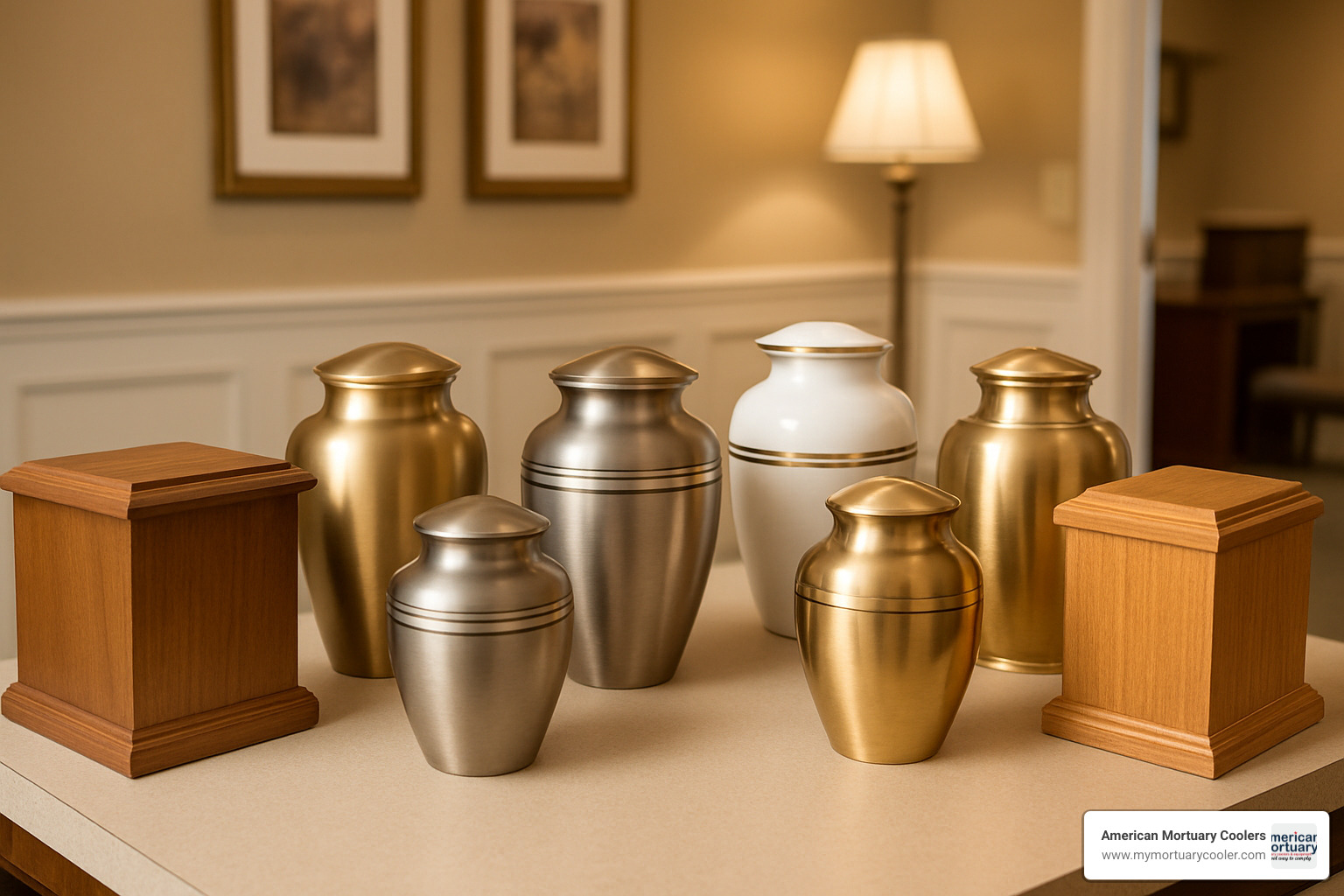
Pros & Cons of Common Materials
| Material | Durability | Cost Range | Engraving Ease | Environmental Impact |
|---|---|---|---|---|
| Wood | Moderate | $50-150 | Excellent | Biodegradable |
| Brass | Excellent | $100-300 | Good | Non-biodegradable |
| Stainless Steel | Excellent | $80-200 | Moderate | Non-biodegradable |
| Marble/Stone | Excellent | $75-250 | Good | Natural/Permanent |
| Ceramic | Good | $40-120 | Excellent | Non-biodegradable |
| Biodegradable | Variable | $30-80 | Limited | Eco-friendly |
Most-Loved Designs & Finishes
Classic vase shapes complement any cemetery setting with timeless appeal. Photo frame urns display cherished images with weather-resistant protection. Military and religious motifs honor service and beliefs with crosses, Stars of David, and patriotic designs.
Minimalist cubes offer clean, contemporary aesthetics, while artisan hand-turned pieces showcase unique craftsmanship that makes each urn special.
Sizing, Capacity & Specialty Options for Burial Urns for Ashes
Sizing burial urns for ashes follows a simple rule: one pound of body weight equals roughly one cubic inch of urn space. A 180-pound person needs about 180 cubic inches. Always add 10-20 cubic inches buffer for safety.
Adult urns typically range from 180-220 cubic inches. Extra-large options go up to 250+ cubic inches, with some wooden urns accommodating remains from someone weighing up to 270 pounds. Child urns are 50-100 cubic inches, while pet urns vary by size.
Keepsake urns hold just 3-25 cubic inches, perfect when multiple family members want small portions while the majority goes to burial.
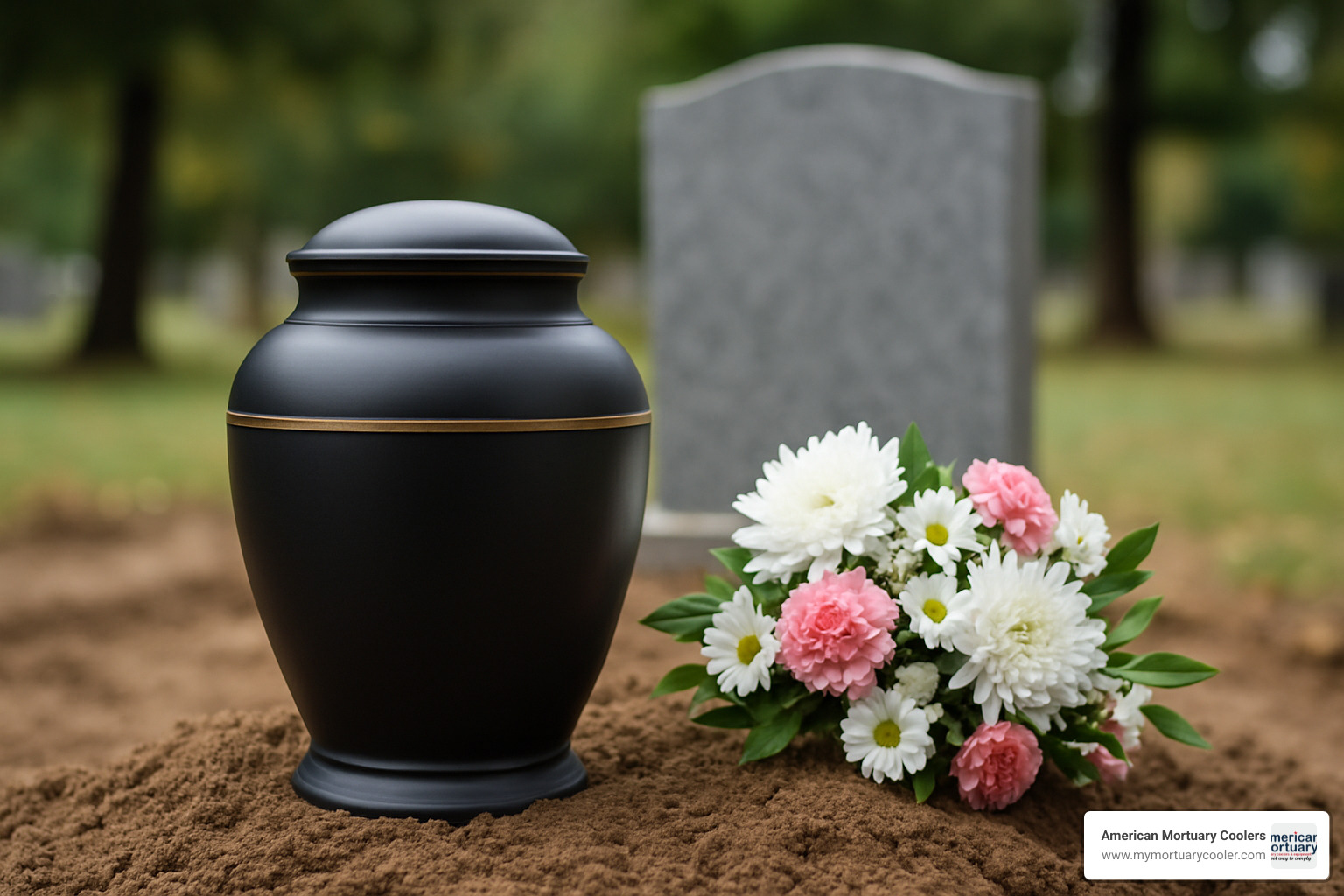
How to Measure and Choose the Right Size
Your funeral director provides exact weight of cremated remains, eliminating guesswork. Many families divide ashes among relatives - choosing a full-size burial urn for cemetery while ordering keepsake urns for distant family members.
Urn Vaults & Cemetery Requirements
Most cemeteries require urn vaults for ground burial to prevent soil settling and protect cemetery grounds.
Polymer vaults are lightweight, durable, and cost-effective ($100-300). Concrete vaults offer maximum protection ($200-500) and resist soil pressure excellently.
Vaults protect against water table issues and prevent sunken grave markers. Cemetery staff handle installation as part of regular service.
Personalization, Pricing & Budget Planning
Personalizing burial urns for ashes creates meaningful tributes beyond simple containers. Engraving remains most popular - from traditional hand-engraving to modern laser etching for detailed portraits and intricate designs.
Photo plates resist fading and weather damage, keeping cherished images vibrant ($50-150). 3D printed elements add personalized touches like miniature golf clubs or religious symbols. Color fills in gold, silver, or bronze make engraved text pop.
Custom poems or quotes capture your loved one's philosophy. Urn accessories like velvet bags and memorial jewelry complete the memorial experience.
Burial urns for ashes range from $26.28 to over $199.99, influenced by materials, manufacturing complexity, personalization level, and craftsmanship. Handcrafted pieces cost more but offer unique character.
Balancing Cost with Tribute Value
Insurance benefits sometimes cover burial urn expenses. Prepaid funeral plans might include urn allowances with better pricing through funeral home relationships.
Supporting small businesses offers unique designs and personalized service. Tax considerations might apply for significant funeral expenses - consult a tax professional.
Remember: the most expensive urn isn't necessarily the most meaningful. A simple wooden urn with heartfelt engraving often creates more powerful tributes than elaborate pieces that don't reflect personality.
Eco-Friendly & Biodegradable Choices
Environmentally conscious burial urns for ashes honor loved ones while protecting the planet, returning remains to earth naturally without lasting environmental impact.
Tree-seed urns combine ashes with selected seeds and nutrient-rich soil. The biodegradable container breaks down while trees grow, creating living memorials that give back to earth.
Sand and salt urns dissolve completely in water without harming marine life, perfect for families with water connections. Handmade paper pods use recycled materials with flower petals or leaves, gradually breaking down in soil.
Mushroom mycelium urns use fungal networks to speed decomposition while enriching surrounding soil - fascinating science for environmentally minded families.
Check burial site rules before choosing biodegradable options. Green cemeteries often require eco-friendly urns, while traditional cemeteries might have different policies. Look for Green Burial Council certification ensuring strict environmental standards.
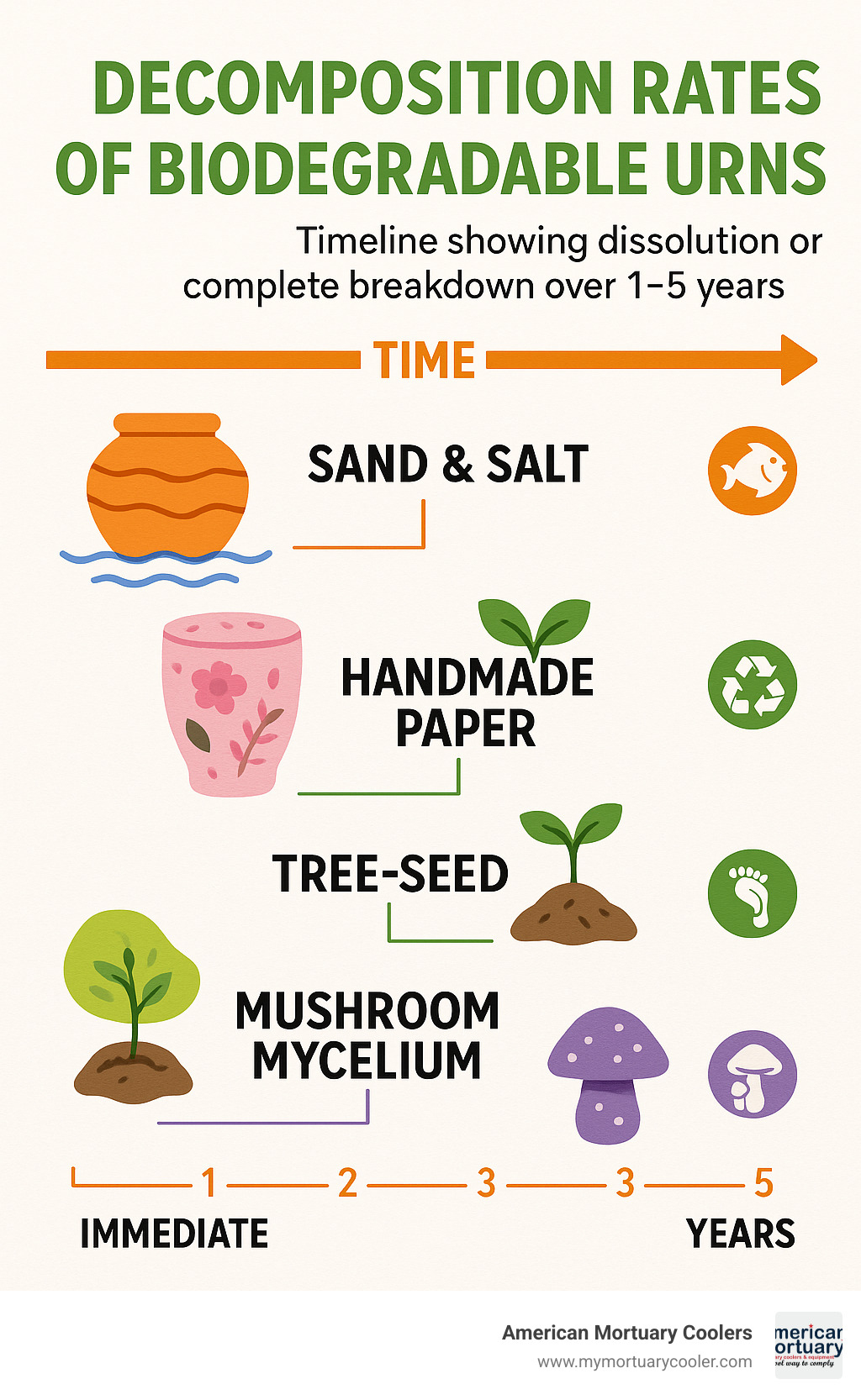
Pet Ashes & Green Memorials
Pet memorial urns deserve thoughtful consideration. Paw-print designs and breed-specific decorations celebrate unique bonds, ranging from tiny containers for birds to large urns for 100+ pound dogs.
Dual pet-owner urns recognize deep emotional connections, allowing beloved pets alongside owners. Backyard burial ordinances vary dramatically - many areas allow pet burial on private property while restricting human remains to licensed cemeteries.
The Burial Process Step-by-Step
Understanding the burial process brings comfort during difficult times. Getting paperwork sorted includes death certificates, cremation certificates, and burial permits - cemetery staff guide you through requirements they handle daily.
Scheduling the burial involves coordinating with cemetery personnel, clergy or celebrants, and family members. Book weekend services or holiday burials well in advance.
Clergy or celebrants provide structure and spiritual guidance, whether religious leaders or secular celebrants. Some families create personal ceremonies with family member readings.
Placement happens at 2-4 feet depth depending on cemetery policies. Sealing the urn vault is handled by experienced cemetery staff who manage technical requirements while you focus on emotional significance.
Cemetery etiquette is simple: dress respectfully, arrive on time, and follow staff guidance regarding positioning and participation.
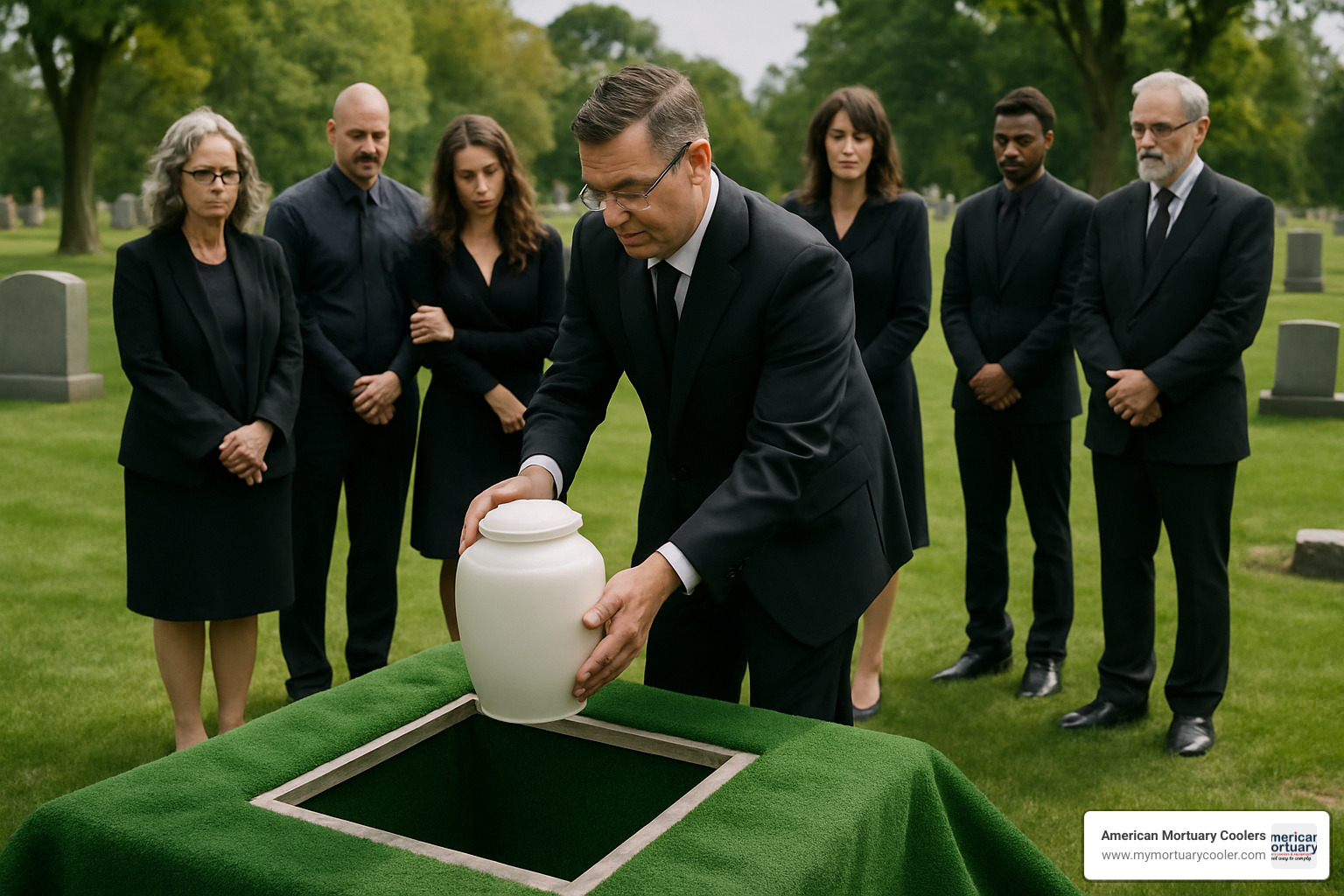
Caring for the Urn Before and After Burial
Proper storage means climate-controlled environments - avoid basements or attics with extreme temperatures. Transporting urns safely to cemeteries is often handled by funeral homes, or use sturdy boxes with padding if handling yourself.
After burial, maintaining granite markers becomes ongoing honor through cemetery maintenance services or simple cleaning techniques. Understanding exhumation rights regarding future relocation helps with long-term planning - ask about cemetery policies upfront.
Frequently Asked Questions about Burial Urns for Ashes
Do all cemeteries require an urn vault?
No, but most do. Most traditional cemeteries mandate urn vaults to prevent ground settling and protect underground utilities. Some allow direct burial of approved materials like cultured marble or heavy-duty plastic that maintain shape underground.
Green burial grounds often prohibit vaults entirely to encourage natural decomposition. Always verify requirements with your chosen cemetery before purchasing - this single call prevents wrong purchases and unexpected costs.
Can multiple family members share one urn?
Absolutely, and it's increasingly common. Companion urns for couples offer separate compartments keeping ashes distinct, or larger chambers where ashes mix together.
Some wooden urns accommodate up to 270 pounds of remains for multiple family members. Consider future access needs before deciding - exhumation involves paperwork and costs. Many families choose one primary burial urn with smaller keepsake urns for individual members.
How long do biodegradable urns take to break down?
Water-soluble urns dissolve in minutes to hours in oceans, lakes, or rivers. Paper and cardboard urns take 6 months to 2 years in soil, depending on moisture and temperature. Salt urns break down within days in water but last months in dry soil.
Mushroom mycelium urns decompose within 30-90 days while enriching soil. Look for Green Burial Council certified urns with specific decomposition timelines and environmental impact information.
Conclusion
Selecting the perfect burial urns for ashes creates a lasting legacy that honors your loved one's memory while bringing peace to your family. We've explored durable materials, personalization options, and practical considerations that help you make this important decision with confidence.
The peace of mind from making the right choice is immeasurable. Whether choosing a beautiful brass urn that endures for generations or a handcrafted wooden vessel that returns naturally to earth, you're giving a precious gift of knowing their final resting place reflects the love and respect they deserved.
This decision doesn't have to feel overwhelming. Funeral directors and cemetery staff understand these choices and can guide you through requirements with compassion. Trust your instincts about what feels right for your family.
At American Mortuary Coolers, we've spent years supporting funeral professionals across the contiguous 48 states from our Tennessee headquarters. While we specialize in mortuary equipment, we understand the sacred responsibility of caring for families during vulnerable moments. Every detail matters when honoring a life well-lived.
The legacy you create through thoughtful urn selection will comfort your family for years to come. Whether through peaceful cemetery visits, memorial garden tending, or simply knowing your loved one rests in dignity, your choice becomes part of your family's healing story.
Your loved one deserves the same thoughtfulness in their final resting place as any important family decision. Take time to ask questions, compare options, and choose with confidence. A well-selected burial urn for ashes becomes a beautiful, lasting tribute to someone who meant the world to you.

















